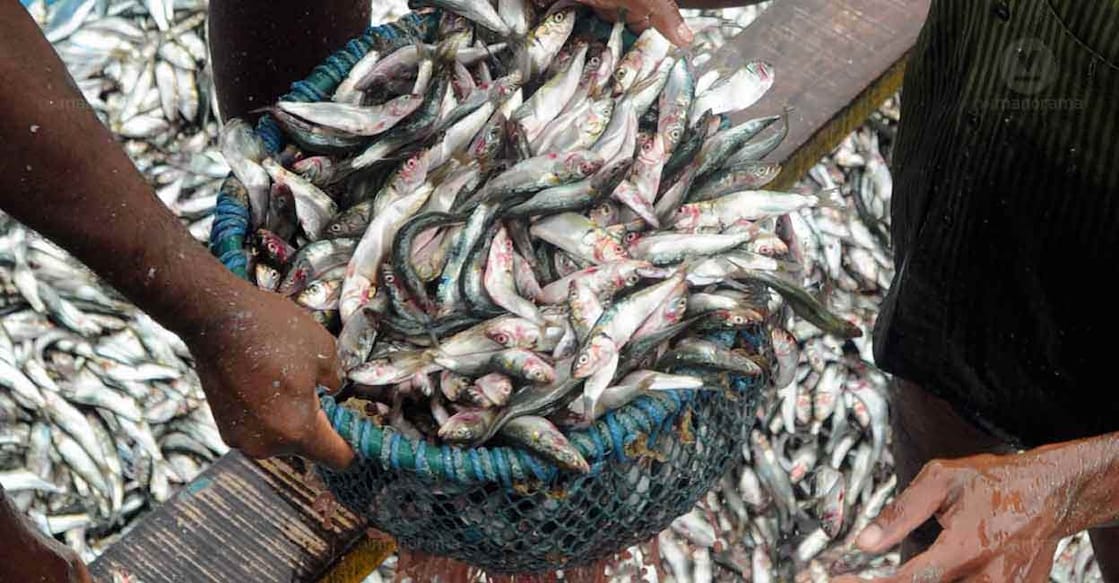Sardine prices soar to over Rs 400 per kg in Kerala

Mail This Article
Kochi: Sardine - the cheapest fish available in Kerala since time immemorial - has now become a luxury. The price of the fish, commonly referred to as ‘mathi’ or ‘chaala’ in Malayalam, has spiraled upwards from Rs 100 to over Rs 400 a kg.
Consequently, a mid-range hotel in Ernakulam now charges Rs 70 for a plate of two sardines, instead of Rs 60 for three such fish. Another popular variety, mackerel, also costs more and the price in hotels is Rs 80 for each.
Stakeholders in the fishing sector said that the prices have shot up following a drastic reduction of yield, caused by the trawling ban and the impact of climate change. The situation has affected not only fisher-folk but also ordinary people, they said.
Trawling ban
The trawling ban was introduced to restrict fishing in the deep sea by mechanised boats and increase availability of fish. Initially, the ban was in force for 47 days, but over the last four years, the period has been 52 days in Kerala. Meanwhile, other coastal states in India implement the ban for 60 days. During the trawling ban, fishing is allowed only for traditional workers in small boats with inboard or outboard engines. Not surprisingly, owners of mechanised boats and employees have consistently opposed the trawling ban.
Of the 3,800 mechanised fishing boats registered in Kerala, around 1,000 operate from Kochi. Meanwhile, the number of other fishing boats in Kerala is around 34,000 and nearly one lakh traditional fisher-folk work on them.
Even though traditional fish workers received good harvests during the period of trawling ban in previous years, the catch has been negligible this year. In fact, popular varieties such as sardine, mackerel (ayala), anchovy (netholi) and trevally (vatta) have disappeared from the coast of Kerala, said fisher-folk in Munambam and Vypeen areas of Kochi.
Climate change
Experts on the sector explain the present plight of the fishers: “The expenses for venturing out to the sea come to Rs 30,000 each time. Kerosene, which is needed as fuel, is in short supply. Subsidy for the item is negligible. Moreover, the impact of global warming and climate change is experienced along the coast. Sardine can thrive only in waters where the temperatures are in the range of 26-27 degrees Celsius. However, the temperatures in the Indian Ocean Region along the Kerala coast often rise to 28-32 degrees Celsius, making the waters difficult for sardines to survive.”
Owing to the high temperatures along the coast, mature sardines from the deep sea arrive only to lay eggs in the shallow waters and return to their previous habitat. The sardines remaining near the coast do not grow big in size as food is unavailable. Most of such small-sized sardines caught by traditional fishers are being transported to Tamil Nadu and other states for use as poultry feed.
Kerala’s fish consumption, yield
According to official data, the annual consumption of fish in Kerala is 9.25 lakh tonnes, of which only 6.45 lakh tonnes are caught by fishers in the state. In 2015, the Central Marine Fisheries Research Institute (CMFRI) specified the minimum legal size of 58 varieties of fish. The size of sardine is 10 cm and mackerel 15 cm under these stipulations. But the sardines that traditional fishers catch during the trawling ban period measure only 7 or 8 cm.
The experts said that Kerala’s coastal waters have been receiving poor catch for some years now. For instance, of the 8.32 lakh tonnes of fish harvested in 2012, sardine comprised 3.92 lakh tonnes. However, in 2021, the catch of sardine was a mere 3297 tonnes. The situation improved slightly in 2022, when 1.10 lakh tonnes of sardine were harvested. There was further improvement in 2023, with a yield of 1.38 lakh tonnes. This year, reports from the coastal areas present a very grim picture and an extremely poor yield is expected.
The social and economic consequences of a shortage of fish varieties such as sardine and mackerel would be huge, said Charles George, state president of Kerala Matsyathozhilali Aikya Vedi (TUCI), an organisation of traditional fishers. “Sardine sustains the livelihood of a majority of people engaged in traditional fishing. The shortage of the fish will have a severe adverse effect on their lives as well as society,” he said.

